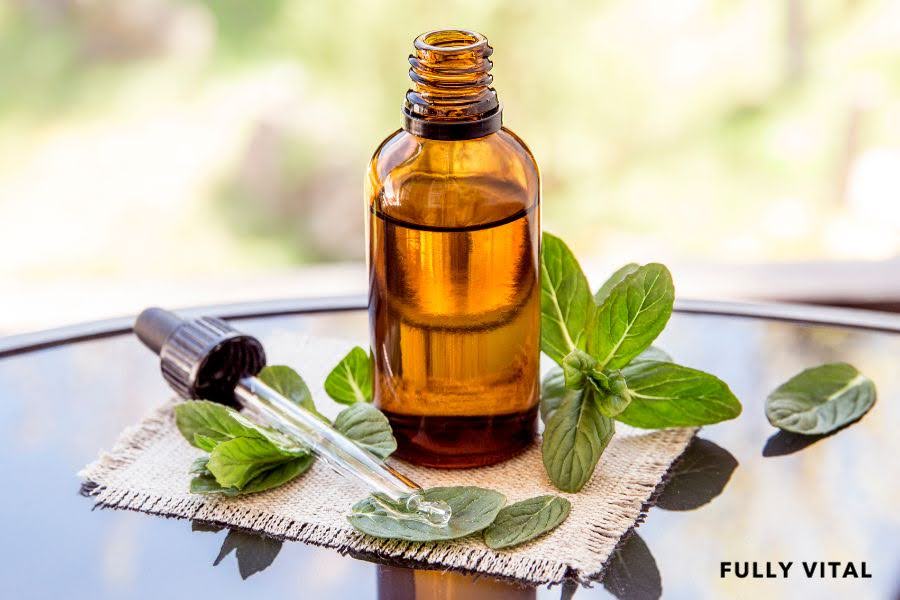
Rosemary oil for hair growth: Benefits and Uses
What is rosemary oil | Top 3 rosemary oil benefits | Benefits for hair growth | Scientific evidence | How to use it | Rosemary oil for skin | Conclusion | FAQ
In the natural wellness world, few essential oils hold as much promise as rosemary oil.
Derived from the aromatic evergreen shrub, rosemary oil is packed with potential benefits, one of the most noteworthy being its ability to promote hair growth.
Brief Overview of Rosemary Oil
Rosemary oil is a potent essential oil extracted from the leaves of the rosemary plant, scientifically known as Rosmarinus officinalis.
This plant, native to the Mediterranean region, has been utilized for its health and culinary benefits since ancient times.
In the world of essential oils, rosemary oil is prized for its invigorating scent and its myriad of health benefits, including its potential to strengthen and grow hair.
Connection Between Rosemary Oil and Hair Growth
Rosemary oil's relationship with hair health is rooted in its unique chemical composition. It contains compounds like rosmarinic acid, camphor, and 1,8-cineole that can stimulate the scalp, improve blood circulation, and in turn, promote healthier hair growth.
Its anti-inflammatory properties can also soothe an irritated scalp, creating a healthier environment for hair to thrive.

I LOVE MY HAIR NOW
FullyVital hair serum and hair vitamins made tremendous improvements in my hair. I truly love my hair now.
Dorit S.,
What is Rosemary Essential Oil?
Description and Origin of Rosemary Essential Oil
Rosemary is a perennial shrub with needle-like leaves and white, pink, purple, or blue flowers.
The essential oil is extracted from the flowering tops of the plant through a process known as steam distillation.
Originating in the Mediterranean region, rosemary has been used for thousands of years for its medicinal properties, and its oil carries these benefits in a concentrated form.
Extraction Process of Rosemary Essential Oil
The process of extracting rosemary essential oil involves steam distillation, where steam is passed through the plant material, causing the essential oil to evaporate.
The steam and oil vapor are then cooled in a condensation chamber, separating the oil and water.
The resulting oil is highly concentrated, carrying the potent benefits of the rosemary plant.
Top 3 Rosemary Oil Benefits
Rosemary Oil Fights Hair Loss
One of the most celebrated benefits of rosemary oil is its ability to combat hair loss.
When applied to the scalp, rosemary oil can stimulate blood circulation, ensuring that hair follicles receive adequate nutrients.
This can slow or even prevent hair loss, promoting healthier, fuller hair.
May Improve Memory
Rosemary oil's benefits extend beyond hair health.
It has been associated with improved memory and concentration.
The uplifting aroma of rosemary oil can stimulate the mind, making it a popular choice for boosting mental energy and focus.
Can Help Lower Cortisol
Rosemary oil can also contribute to stress reduction.
Inhaling rosemary oil has been found to decrease cortisol levels, the body's primary stress hormone.
This can lead to overall reduced stress and anxiety, contributing to overall wellbeing.
Rosemary Oil: Benefits for Hair Growth
Detailed Explanation of How Rosemary Oil Promotes Hair Growth
The primary way that rosemary oil promotes hair growth is by stimulating blood circulation in the scalp.
When the oil is massaged into the scalp, it increases blood flow to the hair follicles.
Increased blood flow means more nutrients and oxygen reach the hair follicles, which can improve hair health and promote growth.
Benefits of Rosemary Oil for Scalp Health
A healthy scalp is the foundation for healthy hair.
Rosemary oil's natural antiseptic properties make it excellent for cleaning the scalp and preventing dandruff.
It also helps to balance the scalp's oil secretion, helping to prevent excessively oily or dry scalp, both of which can be detrimental to hair health.
Moreover, rosemary oil’s anti-inflammatory properties can soothe an irritated scalp, reducing itchiness and other discomforts.
Regularly massaging rosemary oil into the scalp can help to maintain a healthy, balanced environment conducive to hair growth.
Role of Rosemary Oil in Preventing Hair Loss
One of the crucial benefits of rosemary oil is its potential to prevent hair loss.
It does this by strengthening blood circulation, leading to a healthier scalp environment that can hold onto hair roots more firmly.
Furthermore, rosemary oil can combat Dihydrotestosterone (DHT), a hormone that is known to shrink hair follicles and contribute to hair loss.
By inhibiting DHT, rosemary oil can help to prevent hair follicles from shrinking, thereby reducing hair loss.
Rosemary Oil for Hair Growth: Scientific Evidence
Rosemary Oil for Hair Growth Study
A study published in 2015 in the journal Skinmed provides scientific evidence of rosemary oil's effectiveness in promoting hair growth.
The study compared the use of rosemary oil to the commonly used hair growth treatment, Minoxidil.
After six months, both groups saw a significant increase in hair count.
Remarkably, the rosemary group experienced fewer side effects, showing that rosemary oil can be a natural, well-tolerated alternative for hair growth.
Rosemary Oil vs. Minoxidil
While both rosemary oil and Minoxidil have been proven to stimulate hair growth, they work in different ways.
Minoxidil, a vasodilator, widens the blood vessels to increase blood flow to the hair follicles.
Rosemary oil, on the other hand, stimulates the scalp directly to increase blood flow.
Furthermore, rosemary oil offers additional benefits such as improving scalp health and reducing inflammation, making it a holistic treatment for hair health.
Rosemary Oil vs Peppermint Oil
Both rosemary and peppermint oils are potent allies in promoting hair growth, but they work in slightly different ways.
Rosemary oil stimulates blood circulation and combats DHT, a hormone that contributes to hair loss.
On the other hand, peppermint oil invigorates the scalp with a cooling sensation, which can awaken dormant hair follicles and promote growth.
In a 2014 study in "Toxicological Research," peppermint oil showed significant increase in hair growth, depth, and thickness compared to Minoxidil, a common hair growth treatment.
While both oils are beneficial, consider combining both for a potent, hair-stimulating blend.
How to Use Rosemary Oil for Hair Growth
How to Use Rosemary Oil for Hair Growth
Using rosemary oil for hair growth is straightforward.
Mix a few drops of rosemary oil with a carrier oil like jojoba or coconut oil, and massage it into your scalp.
Let it sit for at least 30 minutes (or even overnight for better absorption) before washing it out with a gentle, sulfate-free shampoo. For best results, do this 2-3 times a week.
How to Make Rosemary Oil at Home?
You can also make rosemary oil at home by infusing fresh rosemary leaves in a carrier oil.
Place rosemary leaves in a jar and cover them with a carrier oil.
Seal the jar and let it sit in a warm, dark place for 4-6 weeks.
Strain the oil and use it just like the store-bought version.
Enhance Effectiveness of Rosemary Oil
To enhance rosemary oil's hair growth benefits, you can add other essential oils known for promoting hair health.
For instance, lavender oil can further improve scalp health, peppermint oil can stimulate blood circulation, and tea tree oil can help unclog hair follicles and increase hair growth.
Remember to always dilute essential oils with a carrier oil before applying them to your scalp.
Rosemary Oil for Skin
Is Rosemary Oil Good for Skin?
Rosemary oil is not just beneficial for hair; it's also great for skin.
Its antiseptic properties can help cleanse the skin and fight acne.
Moreover, it can help tone the skin and reduce the appearance of wrinkles, providing a youthful glow.
Rosemary oil's anti-inflammatory properties can also soothe skin irritations and redness.
How to Use Rosemary Oil for Skin
To use rosemary oil for skin, mix a few drops with a carrier oil and apply it to your face after cleansing.
You can also add a few drops to your daily moisturizer.
For acne-prone skin, rosemary oil can be mixed with aloe vera gel for a soothing and healing face mask.
Conclusion: Benefits and Uses of Rosemary Oil for Hair Growth
In conclusion, rosemary oil is a natural, effective solution for promoting hair growth and improving scalp health.
Its ability to increase blood circulation, prevent hair loss, and improve memory and lower cortisol levels make it a valuable addition to your hair care routine.
Plus, it's backed by scientific studies that attest to its effectiveness against hair loss.
We encourage you to try incorporating rosemary oil into your hair care routine.
Its myriad of benefits, from promoting hair growth to improving scalp health, make it a worthwhile addition.
Remember, patience and consistency are key.
You may not see results immediately, but with regular use, you'll likely see a marked improvement in your hair's health and thickness.
Rosemary Oil for Hair Growth - FAQ
Does Rosemary Oil Work for All Hair Types?
Yes, rosemary oil is beneficial for all hair types. Whether your hair is dry, oily, curly, straight, thick, or thin, rosemary oil can help improve your scalp health and promote hair growth.
However, as with all products, individual results may vary, and it's always best to do a patch test before using it regularly.
How Long Does It Take Rosemary Oil to Grow Hair?
While results may vary from person to person, many people report seeing a difference in their hair growth after about six months of regular use.
It's essential to be patient and consistent with your application, as hair growth typically takes time
Rosemary Oil Side Effects: Are There Any?
Generally, rosemary oil is safe to use.
However, some people may be allergic to it, leading to skin irritation, redness, or inflammation.
Always do a patch test on a small part of your skin before applying it to your scalp.
Pregnant women and people with high blood pressure should consult with a healthcare provider before using rosemary oil.
Can I Apply Rosemary Oil Directly to Scalp?
Rosemary oil should not be applied directly to the scalp.
It's a potent essential oil and should be diluted with a carrier oil like jojoba or coconut oil before application to prevent skin irritation.
How to Dilute Rosemary Oil for Hair?
To dilute rosemary oil, mix a few drops with a carrier oil.
A good rule of thumb is to add 3-5 drops of rosemary oil for every ounce of carrier oil.
This dilution is safe for most people and effective for promoting hair growth.
Can I mix rosemary oil with other oils?
Yes, you can mix rosemary oils with other oils.
We have shared the benefits of peppermint oil, castor oil and lavender oil for hair growth.






